Lenten Holidays
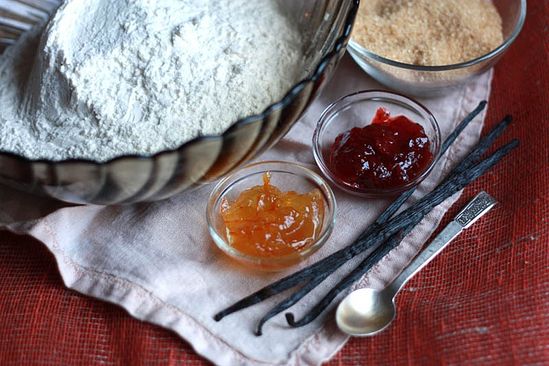 During the time of gastronomically austere yet spiritually joyous Great Lent, there is room for holidays as well—sitting quietly, joyfully, and warmly around the table with close friends and family. Different family members may be fasting to varying degrees—healthy adults, children, the elderly, the ailing—but the holiday table should be set with Lenten foods for all. In this case, it is time for tea, with all the attending sweets.
During the time of gastronomically austere yet spiritually joyous Great Lent, there is room for holidays as well—sitting quietly, joyfully, and warmly around the table with close friends and family. Different family members may be fasting to varying degrees—healthy adults, children, the elderly, the ailing—but the holiday table should be set with Lenten foods for all. In this case, it is time for tea, with all the attending sweets.
In our family, the children have begun this Great Lent in all seriousness; and having thought it over well (and argued over it furiously), they came to a final decision—during the fast they would abstain from entertaining films and cartoons (but continue to watch educational programs and listen to audio-encyclopedias), and… not eat any sweets at all.
The second half of this sincere childhood sacrifice seemed to us too harsh and hard to fulfill. Therefore, another family meeting was called, at which we resolved to abstain from sweets during the weekdays, but to partake of them on weekends and feast days, in reasonable measure.
We did not have to wait long for an excuse. The first week of the fast ended with the traditional visit of grandma and grandpa, along with grandma’s customary pies—this time, Lenten—with buckwheat-mushroom and cabbage fillings, poppy seed rolls, and honey cake. The next day, Monday, was our youngest son Vasily’s birthday. Sesame-date candies, jam horns, carrot cakes, berry marmalade candies, and of course a birthday cake were prepared for that day.
Here are the recipes:
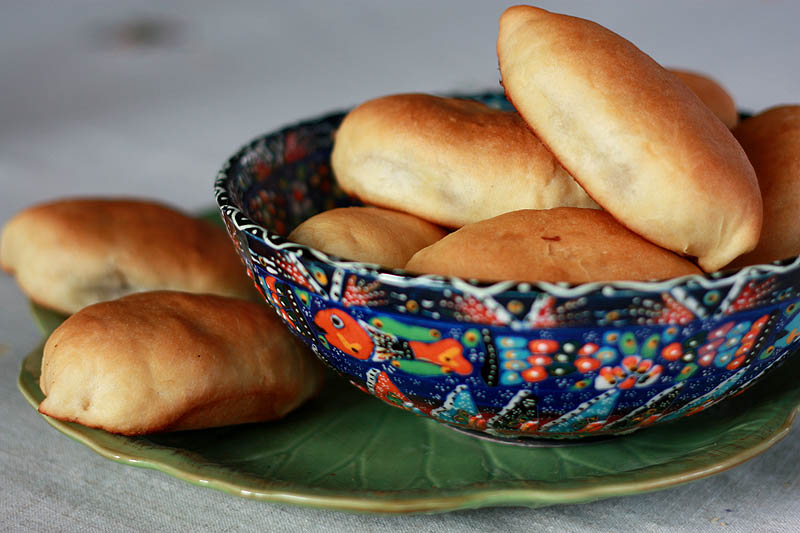
Grandma’s pies (pirogie)
1 kilo (2.2 pounds, or 8 1/3 c.) flour
1 package (11 grams or 2 T) dry yeast
100 grams (3.5 fluid ounces, or just less than ½ c.) Vegetable oil
2 T. sugar
1–1 1/2 t. salt
450-500 ml (about 2 c.) water
1/2 t. Ground cardamom (optional)
Mix flour (preferably sifted) with yeast, sugar, salt, and cardamom. Add warm water, oil; mix and knead the dough until it no longer sticks to your hands. It should be soft and well mixed. Cover with a towel and let rise to double in size, punch down and begin forming the pies.
Fillings for pirogie can be either sweet or savory. Here are some variations: buckwheat, cabbage, or potato with mushrooms (sautéed), rice with green onions, sautéed mushrooms with onion. For sweet ones: any kind of jam, nuts, or dried fruit.
Let the individual pies rise again, then bake in medium oven for about a half hour or until done.
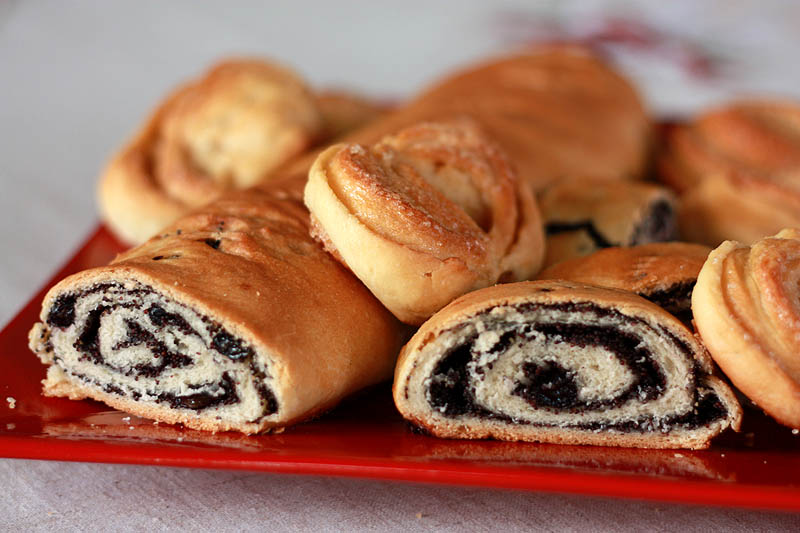
Poppyseed roll
Cover poppy seeds with water for fifteen minutes, then drain. Add honey, raisins, and chopped nuts. Roll out the yeast dough (recipe above) into a large square, spread the poppy seed filling over it, and roll it up.
You can spread a little strong black tea over yeast pirogie and rolls before baking.
Let the roll rise again, then bake in medium oven for about a half hour or until done.
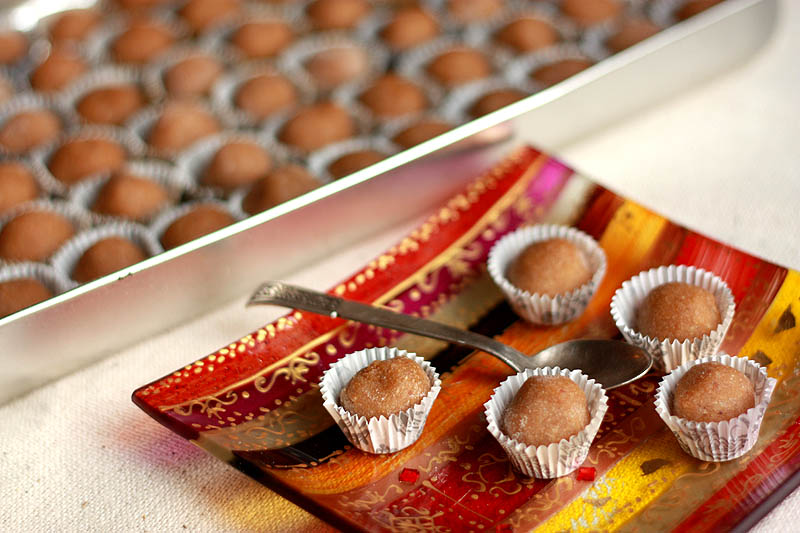
Sesame-date candies
Take large, soft dates, peel off the skin and remove the pits. Wash some black raisins. Blend the dates and raisins together in a blender or food processor, or grind in a meat grinder, to achieve a purée.
Grind some white sesame seeds. Mix all ingredients together well, adding a little lemon juice as needed. Roll into little balls and then roll them in ground nuts, sesame seeds, or rice flour. Keep refrigerated for 5–6 days.
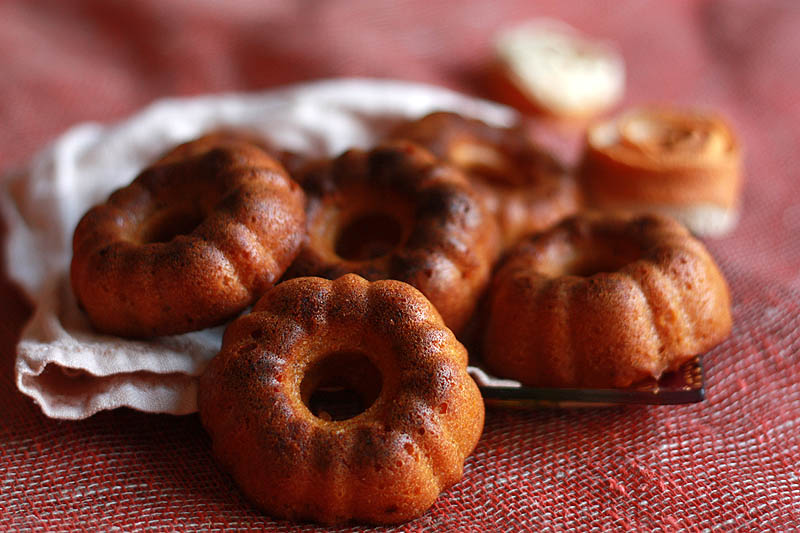 Carrot cakes
Carrot cakes
2 medium size carrots
50 grams (1.7 oz. or just less than 1/4 c.) pumpkin or squash (optional)
1/2 c. vegetable oil
Lemon zest
About a cup of sugar
2 t. baking powder
Flour
2 T. oats or other grain flakes
Grind with food processor or finely grate the carrots. Combine all ingredients, besides the flour and baking powder until you have a batter the consistency of sour cream. You can add any kind of ground nuts, raisins, or candied fruit. Pour into cake forms and bake for about 25 minutes, or until an inserted toothpick comes out clean. Do not open the oven door for at least the first 10 minutes, or the cakes will fall.

Jam horns
1/2 c. deodorized vegetable oil
1/2 c. carbonated water
2 c. flour
2 T. sugar
A little vanilla extract (optional)
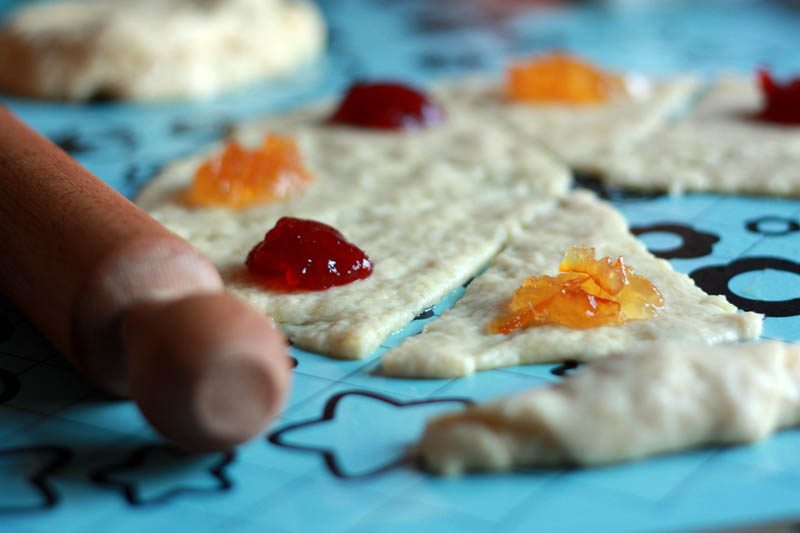
Make a dough from all the ingredients, and divide it into two parts. Roll each part into circles about 20 centimeters (about 8 inches) in diameter, and cut into eight triangles. Place a teaspoon of jam on each one and roll it, from the wide side to the thin, like a croissant. You should use thick jam, marmalade is even better. Thin jam can be thickened before use with corn or potato starch. Bake fifteen minutes at 200–220 degrees. The dough should be slightly browned, but not yellowed.
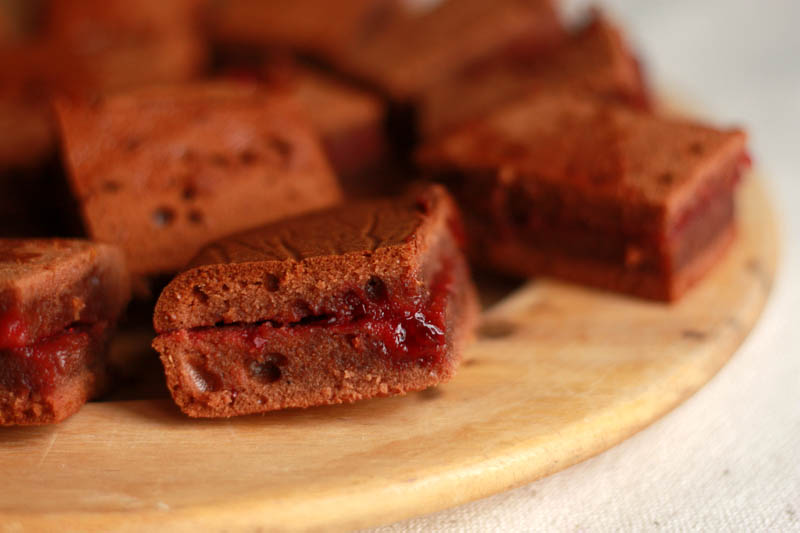
Honey cake
1/2 c. honey
1/2 c. sugar
1 c. water
1 1/2 – 2 c. flour
2 t. baking powder
3 T. cocoa powder
Spices, such as cinnamon, ginger, coriander, and nutmeg—1/2–2 t. altogether.
Nuts, candied fruit, raisins as desired
Jam or preserves for filling
Heat honey, sugar, and water until sugar dissolves. Mix in all other ingredients to the consistency of sour cream. Pour the batter into a greased pan, and bake for 30–35 minutes at 200 degrees (390 Fahrenheit). After removing from pan, let cool completely, then cut into two layers. Spread the first layer with preserves or jam and place the other on top. If you cut the cake while it is still warm, it will fall and become flat.
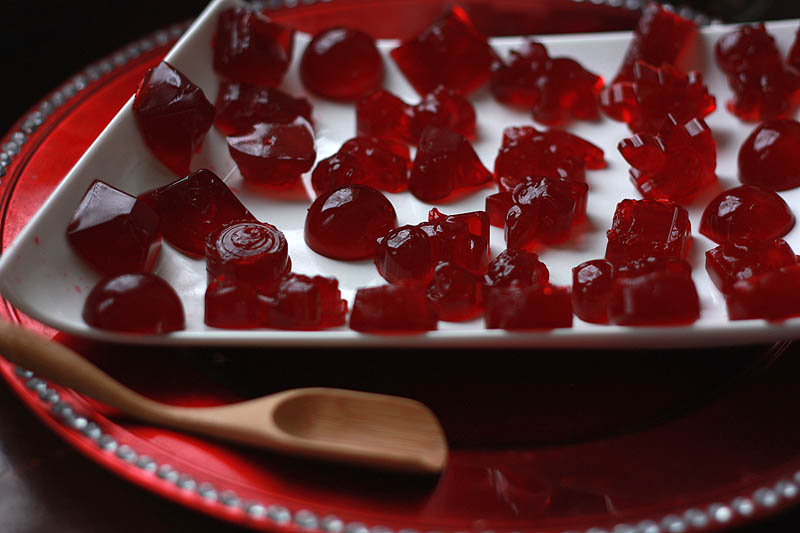 Marmalade candies
Marmalade candies
To make marmalade candies you need agar-agar—a jellying power made from seaweed.
350 ml (1 1/2 cups or 12 fluid ounces) fruit or berry juice
2 t. agar-agar
From 1/2 to 1 c. sugar, depending upon the sweetness of the juice used.
Soak the agar-agar for 20 minutes in 250 ml. (about 1 c.) of juice. Bring the rest of the juice and the sugar to boiling. Add juice with the agar-agar and boil for one minute, cool a little, and pour into forms. Cool in the refrigerator.
Well, and finally…
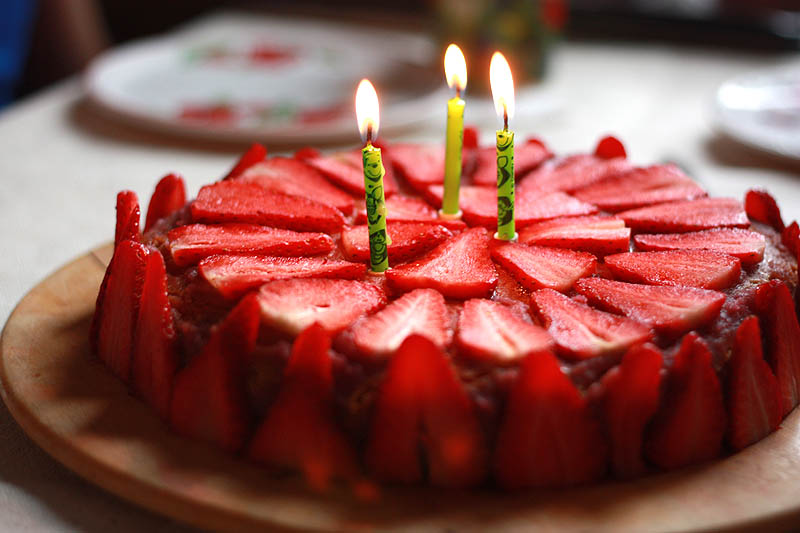
Festive cake
230 grams (just under 2 c. ) flour
250 ml. (1 c.) water
150 grams (3/4 c.) sugar
4 t. baking powder
6 T. deodorized vegetable oil
For the icing:
400 ml. (just under 1 3/4 c.) juice
1 t. agar-agar (optional)
Sugar according to taste
2 T. semolina
Jam or syrup to soak the cake layers
Fresh, frozen, or canned fruit and berries for the filling
Mix all cake ingredients and pour batter into cake pan(s) lined with baking paper. Divide the batter into two parts and pour into two different pans, or use a large rectangular pan and cut into halves after baking—whichever is most convenient. Bake for 24–35 minutes at 180 degrees (350 Fahrenheit). The recipe can be altered; for example, using less sugar, replacing it with sweet syrup and reducing the corresponding amount of water. You can also add cocoa, nuts, vanilla, and zest.
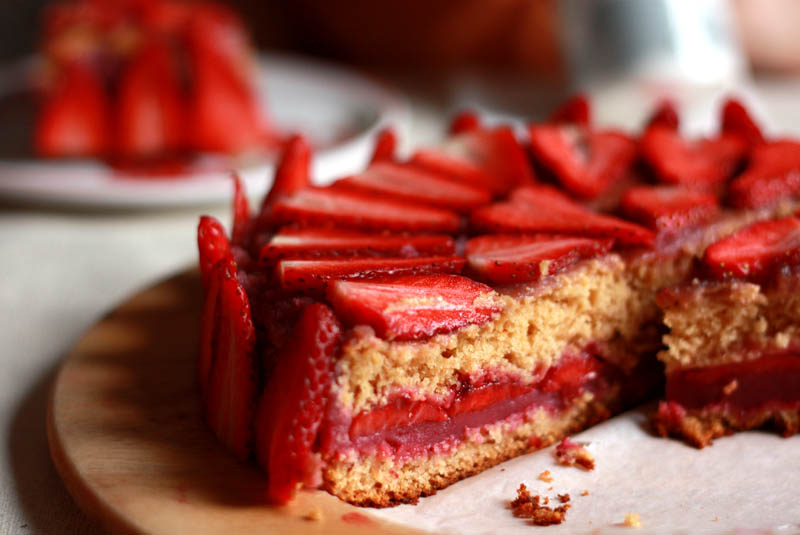
For the icing, divide the juice into two equal parts, soak the agar-agar in one part, and in the other, cook the semolina, stirring continually. Pour the juice with the agar-agar into the juice with semolina, bring to boil, and let cool. You can cool the mixture by placing the saucepan into cold water.
Spread the lower layer with jam or syrup, then pour an equal amount of icing over it and spread. Place fruit over the icing. Spread jam or syrup on the other layer and place it on the other layer, jam side down. Spread the rest of the icing over the top and sides of the cake, then decorate with berries or fruit and cool for two or three hours.
I hope that this bright feeling of family joy will stay with our little one for the rest of their lives, that they and other children will remember the sweet taste of Lenten cakes, and grow up to be adults with good taste in food and in everything else in life.
Have a pleasant fast!!!
Victoria Sverdlova
Source: pravoslavie.ru

